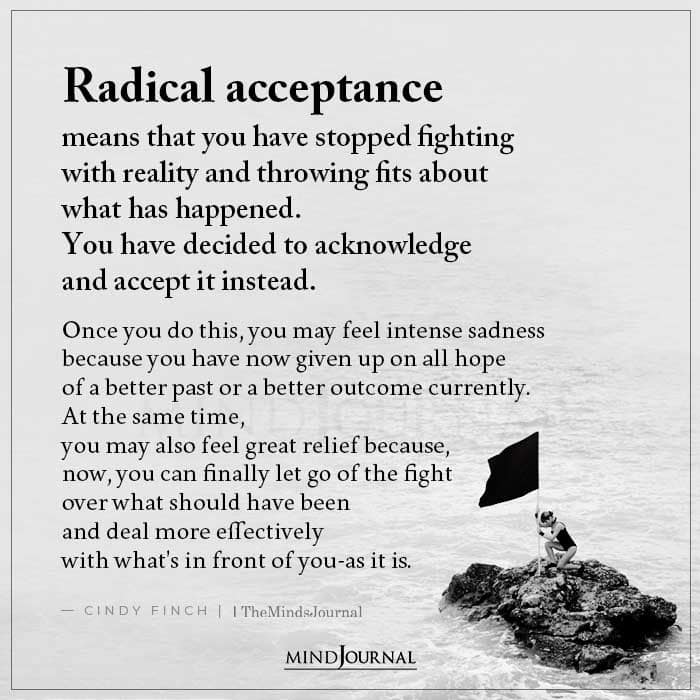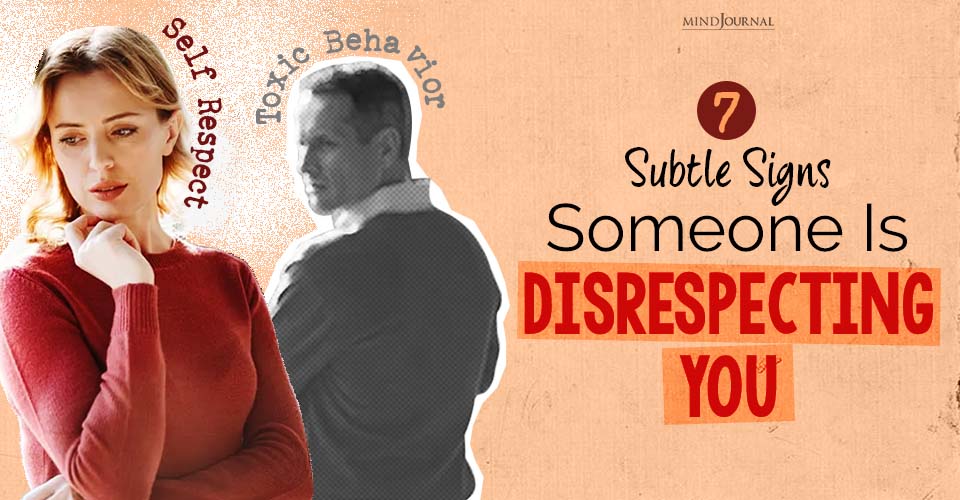Practicing radical acceptance is the key to living a happy, content and genuinely happy life. Understanding radical acceptance and embracing radical acceptance is one of the best things you can do for yourself.
In this article, we are going to talk about what is radical acceptance and the meaning of radical acceptance.
Key Points
- Suffering occurs when one does not accept people and situations as they are.
- Radical acceptance reduces the pain and suffering that results from a lack of acceptance.
- Through accepting the world as it is, one is able to accurately deal with life’s challenges.
Through my work with thousands of patients over two and a half decades as a clinical psychologist, I can say with confidence that one of the main reasons we suffer in life is that we don’t accept people and situations as they are.
Many of us struggle to avoid, resist, or attempt to change the behaviors or attitudes of people in our lives that upset or distress us and end up disappointed, hurt, and discouraged by their inability or disinterest in change.
Or we stay in situations—like a job, a line or work, or an environment—where we are not happy or fulfilled. We live in pain or feel hopeless. We can end up overwhelmed, angry, sad, stressed, and let-down. Our inner turmoil can leave us feeling confused and hopeless.
It is here where radical acceptance can be a game-changer.
Related: The Bittersweet Art Of Acceptance
What radical acceptance is?
The concept of radical acceptance was introduced by Dr. Marsha Linehan, Professor Emeritus of Psychology in the Department of Psychology at the University of Washington, in the 1990s.
Linehan, a prominent American psychologist, also developed dialectical behavior therapy (DBT) for serious mental health conditions.
In a 2011 article in The New York Times, Linehan candidly shared her own mental health struggles and how her life had been transformed by radical acceptance. She explains: “… it’s true that I developed a therapy that provides the things I needed for so many years and never got.”
In a 2012 blog post on Psychology Today, Karyn Hall, Ph.D., offers a precise definition of radical acceptance. She explains that radical acceptance is: “… about accepting life on life’s terms and not resisting what you cannot or choose not to change. Radical acceptance is about saying yes to life, just as it is.”

And what it is not
Most of us are familiar with the Serenity Prayer, in full or in part, that expresses the desire for an ability to “accept the things we cannot change, change the things we can, and the wisdom to know the difference.”
Radical acceptance—accepting situations and people as they are—while enabling us to see the world clearly and accurately, does not entail accepting situations and behaviors that cause us hurt and harm.
In Radical Acceptance, Embracing Your Life With the Heart of a Buddha, author Tara Brach, Ph.D., explains: “Our attitude in the face of life’s challenges determines our suffering or our freedom.”
When we accept people and situations as they are, we can begin to treat ourselves with greater self-compassion, pause, reflect, and process our pain.
When we are able to process our pain, we gain self-awareness and confidence and begin to plant the seeds for what we want for ourselves.
Rather than simply passively accepting situations and relationships with others as they are, we begin to take steps that lead us away from pain and suffering, and into the life we want and deserve.
Related: How Radical Acceptance Can Help You Get Through Tough Times
Creating a pathway out of pain and suffering
Acceptance alone does not shift or change the reality of a situation, but it provides us with clarity and peace of mind that empowers us to effect meaningful changes that are within our control.
In the early initial phase of working with a patient in my private practice, I guide them through an exercise I call Waving the Magic Wand.
Part One of this exercise involves identifying where they ideally would like to be in life, including their career, their relationships, their finances, and other categories. Then comes Part Two, where I challenge them to take a long, hard look at their lives today as it pertains to these same categories.
This exercise compels my patients to look at the reality of their lives in full and identify situations and people with whom they struggle.
Starting with where they are, we work to acknowledge, identify, and accept what is happening, and sit with and process uncomfortable feelings and negative emotions. Then, we then begin to bring in the necessary strategies, tools, and resources to build the life they want for themselves.
We are here to live our highest and best lives, and accepting people and situations as they are—rather than as we want them to be—is key to our peace of mind and our ability to create the life we truly want for ourselves.
Seven steps to change through radical acceptance
1. Acknowledge when you are struggling with someone or something in your life.
2. Identify what (or who) you are struggling with.
3. Explore the dynamics of the conflict between what your ideal situation or interaction would be versus what is really happening.
4. Sit with uncomfortable feelings that come up.
5. Fully grasp and accept what you can and cannot change about the distressing or upsetting situation or relationship.
6. Understand that your acceptance of a situation or another person will not change the reality, but it will allow you to pivot and change course when necessary.
7. Create a realistic plan that includes developing healthy boundaries and bringing in the resources to build strategies and solutions that allow you to manage and move beyond painful situations and people.
Related: How Accepting Things You Cannot Change Makes You Finally Free To Be Yourself
At times, these resources might include a therapist or life coach to provide the skills, psycho-educations, insights, and tools to achieve your goals.
Written By Monica Vermani Originally Appeared On Psychology Today















Leave a Reply
You must be logged in to post a comment.